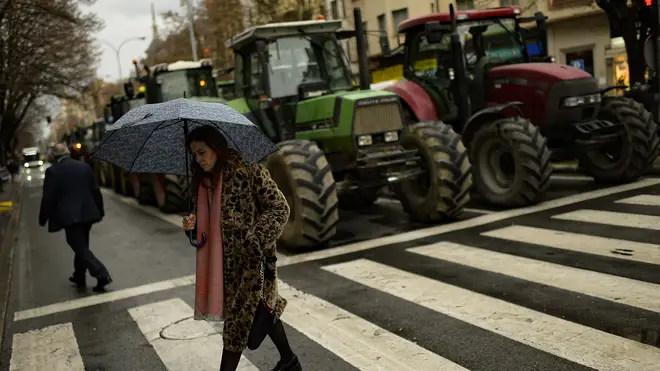
Henry Riley 4am - 7am
9 February 2024, 21:24

The actions follow similar protests in France, Greece and other EU member nations in recent weeks.
Farmers in Spain, Italy and Poland demonstrated on Friday as part of ongoing protests against European Union farming policies and to demand measures to combat production cost hikes, reduced profits and unfair competition from non-EU countries.
The actions follow similar protests in France, Greece and other EU member nations in recent weeks.
Farmers complain that the 27-nation bloc’s environmental and other policies are a financial burden and make their products more expensive than foreign imports.

The European Commission, the EU’s executive arm, has made some concessions to farmers over the last few weeks, including shelving plans to halve the use of pesticides and other dangerous substances.
In Spain, farmers maintain that a law aimed at guaranteeing wholesale major supermarket buyers pay fair prices for their goods is not being enforced while consumer prices soar.
Friday’s protests centred around the northern cities of Oviedo, Pamplona and Zaragoza, with tractors clogging several city streets and commuter roads. In many places, farmers had kept their protests going overnight.
A group not affiliated with Spain’s three main farming organisations has called for farmers to move on Madrid at midnight for a Saturday protest near the headquarters of Prime Minister Pedro Sanchez’s Socialist party.

The demonstrations are expected to continue over the coming weeks with a major protest being organised in the capital for February 21.
Several Spanish media reports have linked many of the protests to conservative and right-wing groups.
Police said 20 people have been arrested during this week’s demonstrations.
In Poland, where imports of cheap grain, milk and other produce from Ukraine have caused particular anger, farmers angered especially by imports of cheap grain, milk and other produce from Ukraine, drove tractors across the country to slow down traffic and block major roads, some displaying signs that read “EU Policy is Ruining Polish Farmers”.
Access roads to border crossings with Ukraine in Hrebenne and Dorohusk, in the east, were blocked by tractors, with only a trickle of traffic being let through.

In the western city of Poznan, the police estimated that some 1,400 tractors entered the streets and reached the office of the regional governor. Protesters lit flares there and placed a coffin, symbolising the death of Polish agriculture, as well as a manure-filled wheelbarrow with an EU flag stuck in it.
There was no violence reported.
Agriculture Minister Czeslaw Siekierski said he understood the grievances and he would talk to the farmers, who said they were also protesting on behalf of Polish consumers.
Deputy prime minister Wladyslaw Kosiniak-Kamysz called on the EU commissioner for agriculture, Janusz Wojciechowski, Poland’s former agriculture minister, to resign. There was no immediate reaction Mr from Wojciechowski.
Adrian Wawrzyniak, spokesman for the Solidarity Union of Individual Farmers, told The Associated Press: “The protest is directed against the policy of the European Union, against the Green Deal and against the policy that allows for an uncontrolled inflow of farming produce from Ukraine.”
He said storage warehouses are filled with Ukrainian grain causing prices to fall 40% in 2023. There is lower demand for Polish sugar, milk and meat, making farmers hold off on investments.
Farmers are also concerned that the EU’s Green Deal, which calls for limiting the use of chemicals and limiting green gas emissions, will result in a reduction in production and income.
They say that the EU’s requirement for 4% of farmland to be devoted to biodiversity and landscape protection will also have a negative effect on their output.

In Italy, a small convoy of tractors moved across Rome’s historical centre to the Colosseum, escorted by police patrols.
Farmers have been peacefully protesting outside of Rome and across the country for days to express their discontent
Premier Giorgia Meloni has repeatedly said that her right-wing government has already addressed some of the farmers’ key requests, but many of them feel neglected.
Ms Meloni stressed that her government has already earmarked an extra three billion euros (£2.5 billion) from the Italian chunk of EU’s post-pandemic recovery funds, raising total resources dedicated to the agricultural sector to eight billion euros (£6.8 billion).
On Friday afternoon, at a roundtable with her ministers and some delegates of the main agricultural associations — not including representatives of the protests — the Italian premier also agreed to extend an income tax exemption for farmers in force since 2017, but only for low-income earners.
Many Italian farmers say they do not feel represented by large sector associations, which they say are removed from their daily struggles.
Later on Friday, a few protest representatives met separately with Agriculture Minister Francesco Lollobrigida, but that move did not stop a new convoy of hundreds of tractors from starting a procession on Rome’s main motorway ring road.